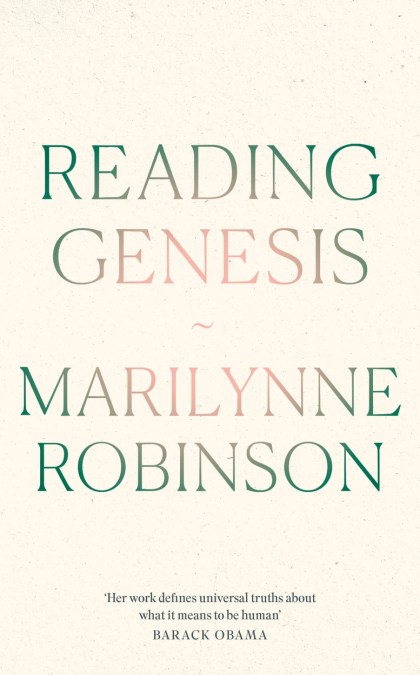Reading Genesis
On sale
14th March 2024
Price: £25
A brilliant and dramatic close reading of the first book of the Bible focussing on the complex relationship with humankind
‘A work of exceptional wisdom and imagination’ DR ROWAN WILLIAMS, DAILY TELEGRAPH
‘Rich and provoking… Robinson has masterfully traced a sense of wonder back to its ancient, remarkable source’ JULIAN COMAN, OBSERVER
‘Reading Genesis is alive with questions of kindness, community and how to express what we so often struggle to put into words’ NEW YORK TIMES MAGAZINE
For generations, the Book of Genesis, included in its entirety here, has been treated by scholars as a collection of documents by various hands, expressing different factional interests, with borrowings from other ancient literatures that mark the text as derivative. In other words, academic interpretation of Genesis has centered on the question of its basic coherence, just as fundamentalist interpretation has centered on the question of the appropriateness of reading it as literally true.
Marilynne Robinson’s approach is different. Hers is one of an appreciation of Genesis for its greatness as literature, for its rich articulation and exploration of themes that resonate through the whole of Scripture. She illuminates the importance of the stories of, among others, Adam and Eve; Noah and his ark; the rivalry of Cain and Abel; and the father and son drama of Abraham and Isaac, to consider the profound meanings and promise of God’s enduring covenant with humankind. Her magisterial book radiates gratitude for the constancy and benevolence of God’s abiding faith in Creation.
Newsletter Signup
By clicking ‘Sign Up,’ I acknowledge that I have read and agree to Hachette Book Group’s Privacy Policy and Terms of Use
Reviews
The genius of Reading Genesis lies in its collapse of the space between the holy and the mundane, the metaphysical and the physical
Like so much of Robinson's writing, Reading Genesis is alive with questions of kindness, community and how to express what we so often struggle to put into words
Drawing on her experience as a novelist, Robinson explores the use of repetition and parallel stories and traces the core themes, from the (then) wholly new statement that "God is the good creator of a good creation" to the desire for and love of children and the contrariness of humankind. Robinson marvels over "the remarkable realism" in depictions of the emotional turmoil catalyzed by family conflicts and shocking acts of deceit, betrayal, and revenge... Throughout this deeply involving and enlightening exegesis, Robinson links Genesis to the profound dilemmas of our time
Reading Genesis is not a book with a single argument to make. It invites us to take time in reading the stories again, in the company of one of the foremost novelists today in the English language. Many readers of Robinson's fiction have spoken of the sense of "authority" in her writing... it is a work of exceptional wisdom and imagination
In luminous prose Robinson challenges a modern reader to understand just how unusual a book Genesis is, pregnant with meaning that stretches to our own day... In the face of contemporary atrocities, geopolitical strife and the threat of human-made environmental catastrophe, a work championing the goodness of creation and the infinite value of human life can offer a salutary read, calling us to our responsibilities... In spite of everything, Robinson finds a way to produce a powerful meditation on hope at a time when that virtue is generally in short supply. In this rich and provoking study, Robinson has masterfully traced [a] sense of wonder back to its ancient, remarkable source
A dedicated layperson's journey through the Book of Genesis. The author meanders delightfully through the text, ruminating on one tale after another while searching for themes and mining for universal truths. Robinson approaches Genesis with a reverence and level of faith uncommon to modern mainstream writers, yet she's also equipped with the appropriate tools for cogent criticism... luminous
Robinson skilfully melds her literary interpretation with her theological one

